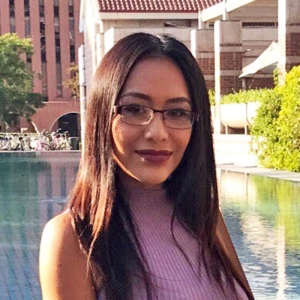Meet MSW Student and Marine Corps Veteran Melody Silva
February 14, 2019- Students
Marine Corps veteran and USC social work student Melody Silva is committed to addressing the mental health needs of victims of military sexual trauma and the military population at large.
Melody Silva, a third-year student at the USC Suzanne Dworak-Peck School of Social Work, will complete her MSW in the Department of Adult Mental Health and Wellness on the military track this spring.
Her decision to pursue this track was catalyzed by an inciting incident during her service with the Marine Corps. As she completes her social work education, Silva reflects on her experience in the military and shares her hopes for providing integrated mental health services to military members—especially those who have suffered from military sexual trauma.
USC Suzanne Dworak-Peck School of Social Work: Tell us about your experience in the military and what led you to pursue a social work education.
Melody Silva: I joined the Marine Corps straight out of high school and served as a corporal, meaning I supervised junior marines, facilitated trainings and conducted safety briefings to ensure every marine was adequately fit for duty. I deployed twice during my four years in the military, serving in Operation Iraqi Freedom.
During my service, something happened that changed the course of my life. One of my best friends in the military was sexually assaulted by our supervisor. When our command was made aware of the incident, they didn’t intervene, reprimand the perpetrator or address the issue at all. It was extremely frustrating, and exposed a lack of adequate protections for female service members and victims of military sexual assault. I decided to leave the military in 2010 in the hopes of pursuing an education that would allow me to help others in this position.
I went on to pursue my undergraduate degree in psychology from Pepperdine University. During my time there, I participated in a work-study program that involved tutoring students at Malibu High School. It was so rewarding to be able to see the direct impact I was having on these teenagers’ lives. I began considered professional avenues that would allow me to help others and eventually decided to apply for my MSW at USC.
USC: In your experience, what have been some of the highlights of the MSW program?
MS: The field training component of the MSW has proven extremely valuable, especially since the placement team makes a concerted effort to match students in accordance with their professional interests.
In my first placement, I served at the East Los Angeles Women’s Center, an agency providing a variety of services for women who have been victims of domestic violence or are struggling with substance abuse problems. In this placement, I facilitated a support group using evidence-based practice from Seeking Safety: A Treatment Manual for PTSD and offered crisis intervention, motivational interviewing and problem-solving therapy in one-on-one settings.
This year, I’m working with adult patients at the Harbor-UCLA Medical Center psychiatry clinic. Not only am I receiving regular trainings in all types of psychiatric therapies, from cognitive behavioral therapy to prolonged exposure therapy—I am gaining on-the-ground experience implementing these techniques to treat real patients.
The USC faculty has also added immense value to my experience in the MSW program. Faculty members are committed to ensuring that every student receives the support and resources they need, both inside and outside of the classroom, to feel confident in pursuing the branch of social work that interests them. For instance, Research Associate Professor Sara Kintzle has gone above and beyond to provide me with additional resources in the area of military sexual trauma. Her guidance empowered me to give presentations on sexual violence in the military at the East Los Angeles Women’s Center even after my clinical placement ended.
USC: How do you hope to apply the skills that you’ve gained during your field placements to your career in social work?
MS: My primary goal is to work with the military—especially with victims of military sexual trauma. Although neither of my clinical placements have involved direct work with military populations, they have provided me with the clinical skill set to effectively meet the varied mental health needs of military service members.
I am also interested in working with Spanish-speaking communities. Many of my patients at Harbor-UCLA are low-income Hispanic or Latina women, yet there is a shortage of fluent Spanish-speaking practitioners as well as a lack of effective training for non-Spanish-speaking clinicians.
Ultimately, I want to apply my MSW education to advocate for a diverse range of military service members struggling with mental health issues.
To reference the work of our faculty online, we ask that you directly quote their work where possible and attribute it to "FACULTY NAME, a professor in the USC Suzanne Dworak-Peck School of Social Work” (LINK: https://dworakpeck.usc.edu)
